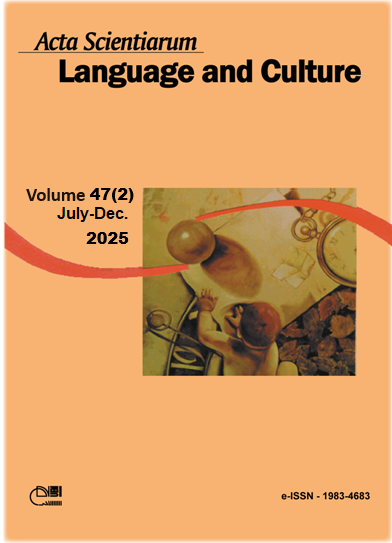A inscrição do trauma: sobre Die Ursache, de Thomas Bernhard
Resumo
Este artigo é um desdobramento de uma pesquisa desenvolvida dentro de uma Residência Pós-Doutoral feita no Programa de Pós-Graduação em Literatura da Universidade Federal de Minas Gerais (UFMG), focada na autobiografia do escritor austríaco Thomas Bernhard (1931-1989). A pesquisa teve como objeto o volume Origem, publicação da Companhia das Letras que compila cinco relatos autobiográficos escritos entre 1975 e 1982. Neste texto, exponho alguns dos resultados referentes à análise do relato escrito em 1975, denominado Die Ursache [‘A causa’]. O objetivo principal foi analisar como a formação do sujeito autobiográfico, por meio das escolhas de composição narrativa, entrelaça-se com os rastros de uma vivência à luz (ou à sombra) do solo austríaco, marcado pelo nazismo e pelo imediato pós-guerra. Recorrendo a alguns recursos teóricos provenientes da psicanálise e do materialismo lacaniano, investiguei como Bernhard utiliza a linguagem como ferramenta para expressar sintomas e angústias resultantes de experiências traumáticas que não são somente suas, mas de um coletivo. Assim, a análise de Die Ursache revela a denúncia da sobrevivência das marcas do Estado nazista, destacando tanto a impossibilidade de conformação social quanto a persistência do trauma, ao mesmo tempo em que desestabiliza a centralidade do relato no ‘ideal de eu’ construído – tomando como ponto de partida a lição de Lacan de que a centralidade do ‘eu’ não existe, bem como, para Žižek, o sujeito jamais se constrói acima da ideologia. Busquei, dessa forma, dialogar com as complexidades históricas e culturais da época de Bernhard – sem recair em psicologizações como ‘ressentimento’ e ‘melancolia’, ou focar no conteúdo do relato apenas como expressão de uma vítima. Por fim, destaco, ao longo do artigo, os momentos que me permitiram observar os sintomas que revelam os obstáculos, a impossibilidade e a persistência do Real.
Downloads
Referências
Bernhard, T. (2006). Origem. Companhia das Letras.
Bohunovsky, R. (2010). À procura da literatura austríaca: da construção à análise de um mito. Pandaemonium Germanicum, 15, 139-162. https://doi.org/10.1590/S1982-88372010000100009
Enriquez, E. (1990). Da horda ao Estado: psicanálise do vínculo social. Zahar.
Flory, A. V. (2006). Sopa de letras nazista: a apropriação imediata do real e a mediação pela forma na ficção de Thomas Bernhard [Tese de Doutorado, Universidade de São Paulo].
Freud, S. (1923-2011). O eu e o id. O eu e o id, "autobiografia" e outros textos - 1923-1925 (vol. 16, Obras completas). Companhia das Letras.
Gagnebin, J.-M. (2009). “Entre moi et moi-même” (“Entre eu e eu mesmo”) (Paul Ricoeur). In H. Galle, A. C. Olmos, A. Kanzepolsky, & L. Z. Izarra (Orgs.), Em primeira pessoa: abordagens de uma teoria da autobiografia (pp. 133-139). Annablume.
Galle, H., & Olmos, A. C. (2009). Apresentação. In H. Galle, A. C. Olmos, A. Kanzepolsky, & L. Z. Izarra (Orgs.), Em primeira pessoa: abordagens de uma teoria da autobiografia (pp. 9-18). Annablume.
Hofmann, P. (1996). Os vienenses: esplendor, decadência e exílio. José Olympio.
Lacan, J. (1964-1974). O seminário, livro 22: R.S.I. (lição de 18 de fevereiro de 1975. Inédito).
Lacan, J. (1992). O seminário, livro 2: O eu na teoria de Freud e na técnica da psicanálise. Zahar.
Lacan, J. (1998). A instância da letra no inconsciente ou a razão desde Freud. In J. Lacan. Escritos (pp. 496-533). Zahar.
Miller, J. A. (2002). Percurso de Lacan: uma introdução. Zahar.
Politzer (2022). Crítica dos fundamentos da psicologia. Lavrapalavra Editorial.
Silva, M. C. (2009). Materialismo lacaniano. In L. O. Zolin, & T. Bonnici. Teoria literária: abordagens históricas e tendências contemporâneas (pp. 205-210). Eduem.
Silva, M. C. (2018). Maio de 68 e o século XXI: o pensamento de Slavoj Žižek. Revista Uniletras, 40(1), 22-32. https://doi.org/10.5212/Uniletras.v.40i1.0002
Zeyringer, K., & Gollner, H. (2019). Áustria: uma história literária - literatura, cultura e sociedade desde 1650. UFPR.
Žižek, S. (1992). Eles não sabem o que fazem: o sublime objeto da ideologia. Zahar.
Žižek, S. (2010). Como ler Lacan. Zahar.
Žižek, S. (2015). O absoluto frágil. Boitempo.
Copyright (c) 2025 Gabriela Bruschini Grecca

This work is licensed under a Creative Commons Attribution 4.0 International License.
DECLARAÇÃO DE ORIGINALIDADE E DIREITOS AUTORAIS
Declaro que o presente artigo é original, não tendo sido submetido à publicação em qualquer outro periódico nacional ou internacional, quer seja em parte ou em sua totalidade.
Os direitos autorais pertencem exclusivamente aos autores. Os direitos de licenciamento utilizados pelo periódico é a licença Creative Commons Attribution 4.0 (CC BY 4.0): são permitidos o acompartilhamento (cópia e distribuição do material em qualqer meio ou formato) e adaptação (remix, transformação e criação de material a partir do conteúdo assim licenciado para quaisquer fins, inclusive comerciais.
Recomenda-se a leitura desse link para maiores informações sobre o tema: fornecimento de créditos e referências de forma correta, entre outros detalhes cruciais para uso adequado do material licenciado.




















6.png)









